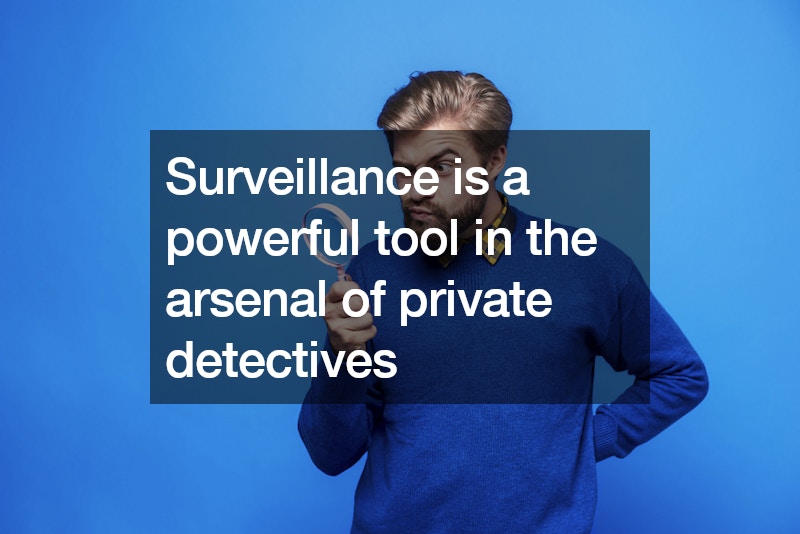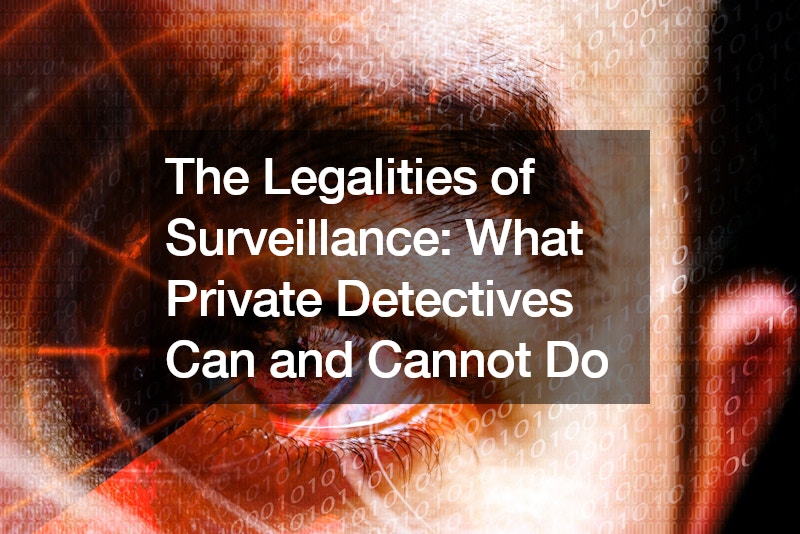
Surveillance is a powerful tool in the arsenal of private detectives, allowing them to gather critical information for their clients. Whether it’s a cheating spouse, a fraudulent insurance claim, or a missing person, surveillance can provide the evidence needed to resolve a case. However, the use of surveillance is bound by strict legal and ethical guidelines that must be adhered to.
This article explores the legalities of surveillance, outlining what private detectives can and cannot do to ensure their investigations remain within the bounds of the law.
Understanding Surveillance in Private Investigations
Surveillance involves the close observation of a person, place, or object to gather information. Private detectives use various methods, including physical observation, photography, video recording, and electronic monitoring. While these methods can be highly effective, they also raise significant privacy concerns, making it essential for detectives to understand and comply with relevant laws.
Legal Framework Governing Surveillance
The legalities of surveillance are governed by a combination of federal, state, and local laws. Key areas of legislation that impact private detectives include:
Privacy Laws: Privacy laws protect individuals from unwarranted intrusions into their personal lives. Private detectives must respect these laws to avoid legal repercussions. For instance, they cannot trespass on private property to conduct surveillance or use deceptive means to gain access to private spaces.
Wiretapping and Eavesdropping Laws: Federal and state laws regulate the recording of conversations. Generally, recording a conversation without the consent of at least one party is illegal. Private detectives must be cautious about using audio surveillance and ensure they are not violating wiretapping laws.
Video Surveillance Laws: The legality of video surveillance varies by jurisdiction. While it is generally legal to record video in public places where there is no expectation of privacy, recording in private areas such as homes or bathrooms is prohibited.
Employment Laws: When conducting surveillance related to employment matters, such as worker’s compensation fraud, private detectives must adhere to employment laws that protect workers’ rights and privacy.
What Private Detectives Can Do
Conduct Surveillance in Public Places: Private detectives can legally conduct surveillance in public places where individuals have no reasonable expectation of privacy. This includes streets, parks, and public buildings. For example, a detective can follow a subject in a public area or take photographs from a distance without violating privacy laws.
Use Technology Within Legal Limits: Private detectives can use technology such as GPS trackers, cameras, and drones as long as they comply with local regulations. For instance, attaching a GPS tracker to a vehicle that the detective owns or has permission to track is legal, but attaching it to a vehicle without consent may be considered illegal.
Gather Publicly Available Information: Private detectives can access and gather information that is publicly available, such as social media profiles, public records, and online databases. This type of research is crucial for building a case without infringing on privacy rights.
Work with Legal Counsel: Collaborating with attorneys can help private detectives ensure their surveillance activities are legally sound. Legal counsel can provide guidance on the permissible scope of surveillance and help navigate complex legal issues.
What Private Detectives Cannot Do
Trespass on Private Property: Entering private property without permission to conduct surveillance is illegal. Private detectives must respect property boundaries and seek alternative legal methods to gather information.
Engage in Wiretapping or Illegal Audio Recording: Recording conversations without proper consent is prohibited by wiretapping and eavesdropping laws. Detectives must obtain consent from at least one party involved in the conversation or avoid audio surveillance altogether.
Infringe on Personal Privacy: Surveillance in areas where individuals have a reasonable expectation of privacy, such as homes, hotel rooms, and bathrooms, is illegal. Private detectives must avoid any actions that could be considered invasive or voyeuristic.
Misrepresent Themselves or Use Deceptive Practices: Private detectives must avoid impersonating law enforcement or using deceit to gain access to restricted areas. Engaging in such activities can lead to criminal charges and damage the credibility of the investigation.
Ethical Considerations
Beyond legal obligations, private detectives must adhere to a strict code of ethics. This includes:
Integrity: Maintaining honesty and integrity in all aspects of their work.
Confidentiality: Protecting the privacy of clients and subjects.
Accountability: Being accountable for their actions and decisions.
Ethical conduct ensures that private detectives build trust with clients and uphold the reputation of the profession.
Conclusion
Surveillance is a critical component of many private investigations, providing valuable insights and evidence. However, private detectives must navigate a complex legal landscape to ensure their activities are lawful and ethical. By understanding and respecting privacy laws, wiretapping regulations, and video surveillance guidelines, private detectives can conduct effective investigations while upholding the rights of individuals. Ultimately, adhering to legal and ethical standards not only protects the detective from legal repercussions but also ensures the integrity and credibility of their work.
.




